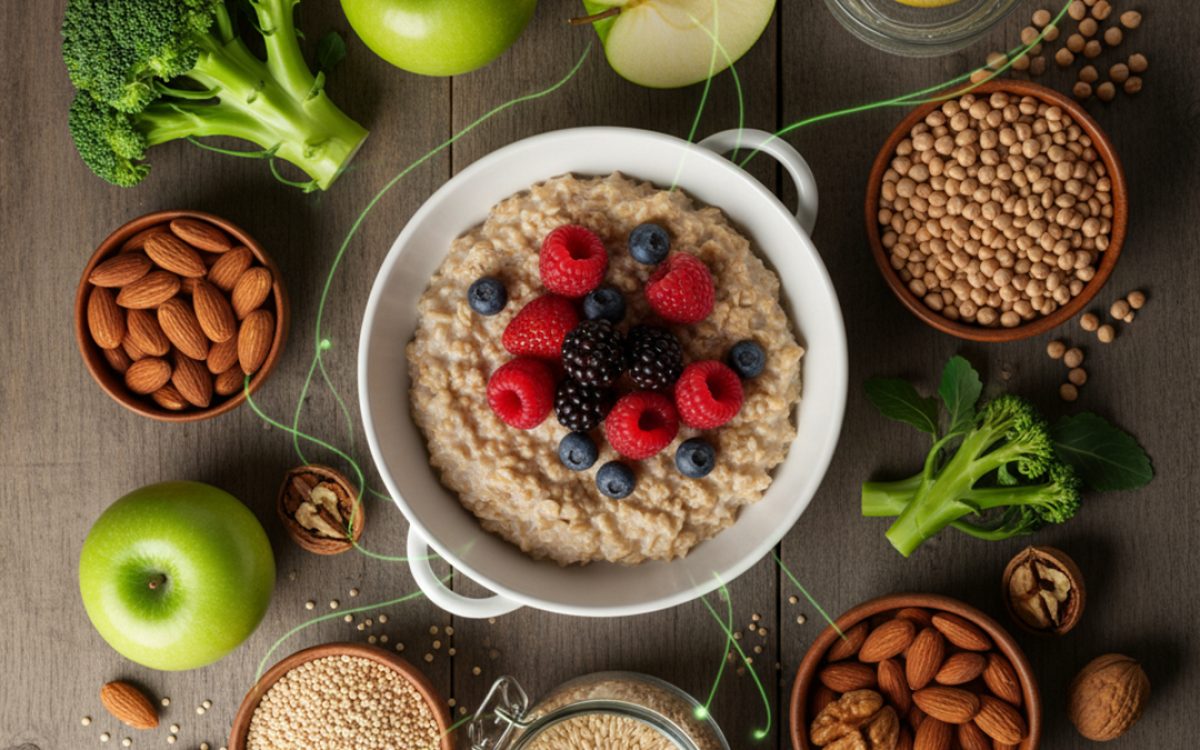Dietary fiber is an essential component of any balanced diet. It does not only improve digestion but also contributes to heart health, regulates blood sugar levels, and helps control weight. Adding fiber-rich foods to your daily meals is a simple yet impactful step for your overall health.
The Importance of Fiber for Digestion
Proper digestion largely depends on the amount and type of fiber in your food. Fiber acts as a natural stimulant for the intestines, increasing stool bulk and making it pass more easily, which greatly reduces the chances of constipation or bloating. It also supports the growth of beneficial bacteria in the gut, which in turn helps break down food and improves nutrient absorption. Most importantly, fiber provides the digestive system with a regular rhythm that keeps your energy levels stable and prevents that heavy or sluggish feeling after meals.

Whole Grains: The Foundation of Healthy Digestion
Whole grains such as oats, quinoa, brown rice, and whole wheat bread are considered the cornerstone of a balanced diet. They are rich in insoluble fiber, which adds bulk to the stool and facilitates its passage through the intestines, significantly helping to prevent constipation and maintain a healthy digestive system. In addition, whole grains provide a wide range of vitamins, such as B vitamins, and important minerals like magnesium and iron, making them an ideal choice for boosting energy and supporting various body functions.
Benefits:
-
- Reduce the risk of constipation due to their high fiber content.
- Help control weight by promoting longer satiety.
- Improve colon health and reduce the risk of chronic diseases such as diabetes and heart disease.
- Provide sustainable energy, as they digest slowly and help stabilize blood sugar levels.
Practical examples to include fiber in your daily life:
-
- Eat a bowl of oats with fruits and nuts for a balanced and filling breakfast.
- Replace white rice with brown rice or quinoa in lunch and dinner meals.
- Choose bread made from whole grains instead of white bread for sandwiches.
- Try whole wheat pasta as a healthier alternative to regular pasta.
- Add a sprinkle of quinoa or oats to salads for extra texture and nutritional value.

Vegetables: A Rich Variety of Fiber
Vegetables are among the most important natural sources of fiber that the body needs daily to maintain digestive health. Green vegetables such as broccoli, spinach, and green beans are not only rich in fiber but also provide the body with a large amount of vitamins (such as A, C, and K) and important minerals like iron and calcium. Together, these nutrients support digestion, strengthen the immune system, and act as natural antioxidants that fight free radicals and protect the body from chronic diseases.
Benefits:
-
- Improve digestion by promoting natural bowel movements.
- Strengthen the immune system thanks to their abundance of vitamins and minerals.
- Provide powerful antioxidants that fight inflammation and protect cells.
- Help with weight management, as they are low in calories yet high in fiber that promotes satiety.
- Enhance skin and hair health due to their high vitamin content.
Practical examples for daily use:
-
- Add steamed or boiled broccoli to lunch or dinner as a nutritious side dish.
- Prepare a salad rich in spinach, cucumber, and tomatoes with a sprinkle of flaxseeds or healthy olive oil.
- Use steamed vegetables like carrots and zucchini as a healthy alternative to fried foods.
- Prepare green smoothies containing spinach or celery mixed with fruits for extra benefits.
- Add green beans or broccoli to soups and stews to boost their nutritional value.

Fruits: Natural Sweetness with Great Benefits
Fruits are not just a source of energy or a refreshing snack; they are a nutritional treasure full of soluble fiber that helps absorb water and form a gel-like substance in the intestines, which facilitates digestion and prevents issues like constipation or indigestion. Moreover, fruits are rich in essential vitamins such as vitamin C, which strengthens the immune system, and vitamin A, which maintains skin and eye health, along with important minerals like potassium that regulate blood pressure.
Key Benefits:
-
- Promote the growth of beneficial bacteria in the gut, improving long-term digestive health.
- Reduce levels of bad cholesterol thanks to soluble fiber.
- Improve the absorption of other nutrients like iron and calcium.
- Help with weight control as they are filling and relatively low in calories.
- Protect the body from inflammation and chronic diseases due to their antioxidants.
Practical examples to include fiber in your daily life:
-
- Eat an apple or a pear as a snack between meals instead of processed foods.
- Add berries or strawberries to yogurt or oatmeal for enhanced nutritional value.
- Drink freshly squeezed orange or grapefruit juice instead of store-bought juices with added sugar.
- Prepare a colorful fruit salad with banana, kiwi, and mango for a refreshing and healthy option.
- Use frozen blueberries or grapes as a natural addition to desserts or smoothies.

Legumes: The Power of Fiber and Protein Together
Legumes such as lentils, chickpeas, beans of all types, and peas are among the strongest foods that combine dietary fiber with plant-based protein, making them an ideal option for maintaining digestive health and promoting satiety for longer periods. Thanks to their high content of both soluble and insoluble fiber, they help improve bowel movement and regulate digestion naturally. They are also rich in vitamins like folic acid and minerals such as iron and magnesium, which are essential for energy production and heart health.
Key Benefits:
-
- Keep you full for long periods, helping with weight management.
- Regulate blood sugar levels, which is especially important for diabetics.
- Boost heart health by lowering bad cholesterol and increasing good cholesterol.
- Support gut health by nourishing beneficial bacteria.
- Provide an excellent source of plant protein, especially for vegetarians.
Practical examples to include them in your daily life:
-
- Eat lentil soup as a nutritious and easy-to-prepare main meal.
- Add boiled chickpeas to salads or prepare them as hummus with tahini for an energy-rich dip.
- Try dishes with red or black beans with rice for a filling and balanced meal.
- Cook peas with vegetables or add them to rice and pasta dishes.
- Replace fast food with a colorful lentil or bean salad full of nutrition.

Nuts and Seeds: Smart Snacks
Almonds, walnuts, chia seeds, and flaxseeds are excellent sources of fiber and healthy fats.
Benefits:
-
- Improve bowel movement.
- Reduce inflammation.
- Support brain health.
Practical examples:
-
- Eat a small handful of almonds or walnuts daily.
- Add chia seeds to smoothies or yogurt.
- Use ground flaxseeds as a topping for salads.

Practical Tips to Increase Fiber Intake
Increasing fiber in your diet is an important step for digestive health, but it requires gradual application and awareness. Here are the most important tips:
- Increase fiber gradually:
Do not raise the amount suddenly to avoid bloating or gas. Start by adding one serving a day, such as a fruit or a portion of vegetables, then increase gradually. - Drink enough water:
Fiber needs water to work effectively in the intestines. Aim for 6–8 glasses daily, especially if you consume a lot of whole grains or legumes. - Diversify fiber sources:
Do not rely on just one source. Combine whole grains, vegetables, fruits, legumes, and nuts to ensure a mix of soluble and insoluble fiber. - Start your day with fiber-rich options:
Such as oatmeal with fruits, or whole-grain bread with vegetables. Breakfast is the best time to fuel your body with energy and fiber. - Choose healthy alternatives:
Replace white rice with brown rice or quinoa, white bread with whole-grain bread, and packaged juices with whole fruits. - Opt for smart snacks:
Such as a handful of nuts, cut vegetables like carrots and cucumbers, or a piece of fruit. These options provide fiber without extra calories.

Incorporating fiber-rich foods into your daily diet is not just a step toward better digestion but a long-term investment in better health and a more energetic life. Start gradually by adding whole grains, more vegetables and fruits, and don’t forget legumes and nuts as essential parts of your meals. Your health begins with your plate, and fiber is the key.





